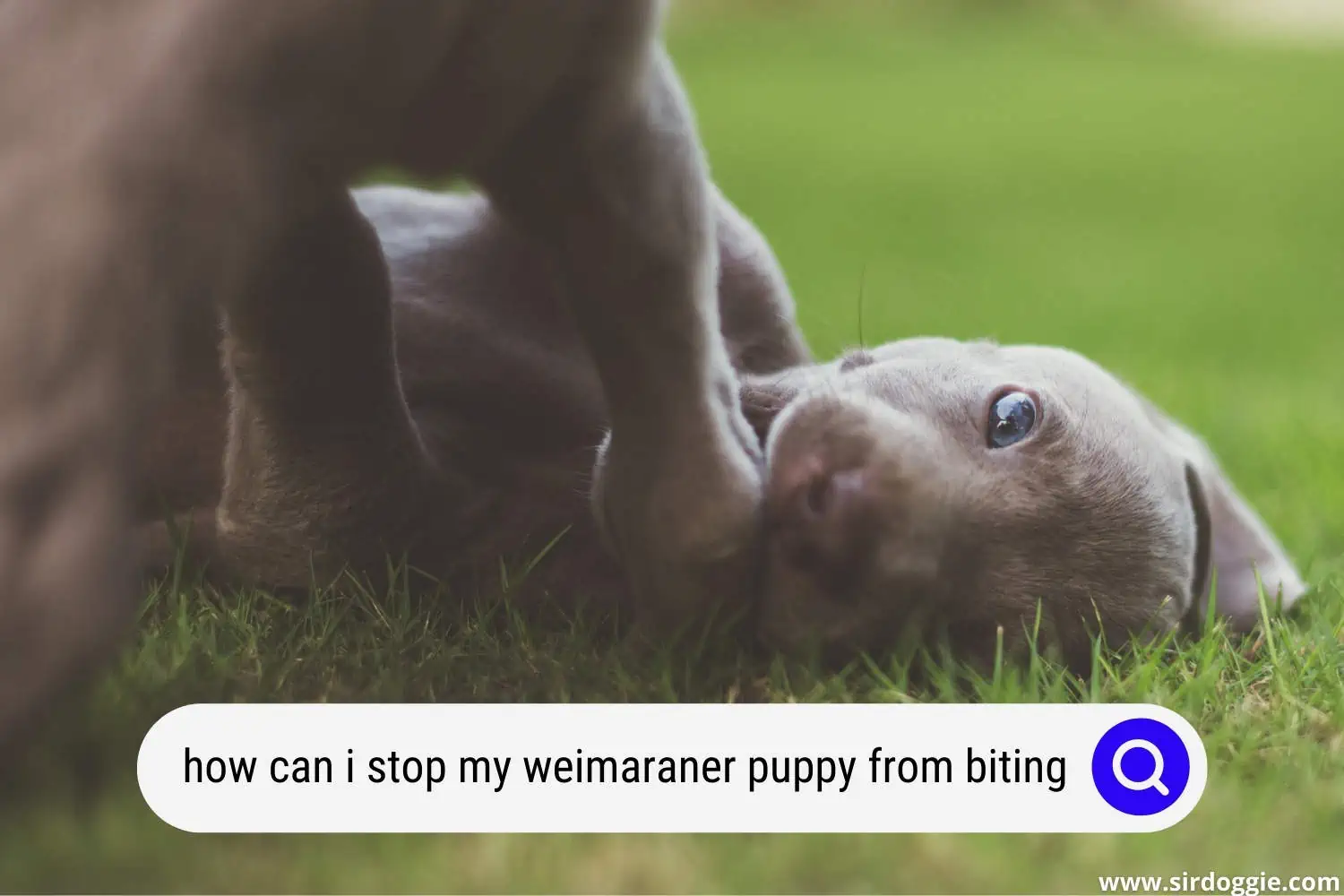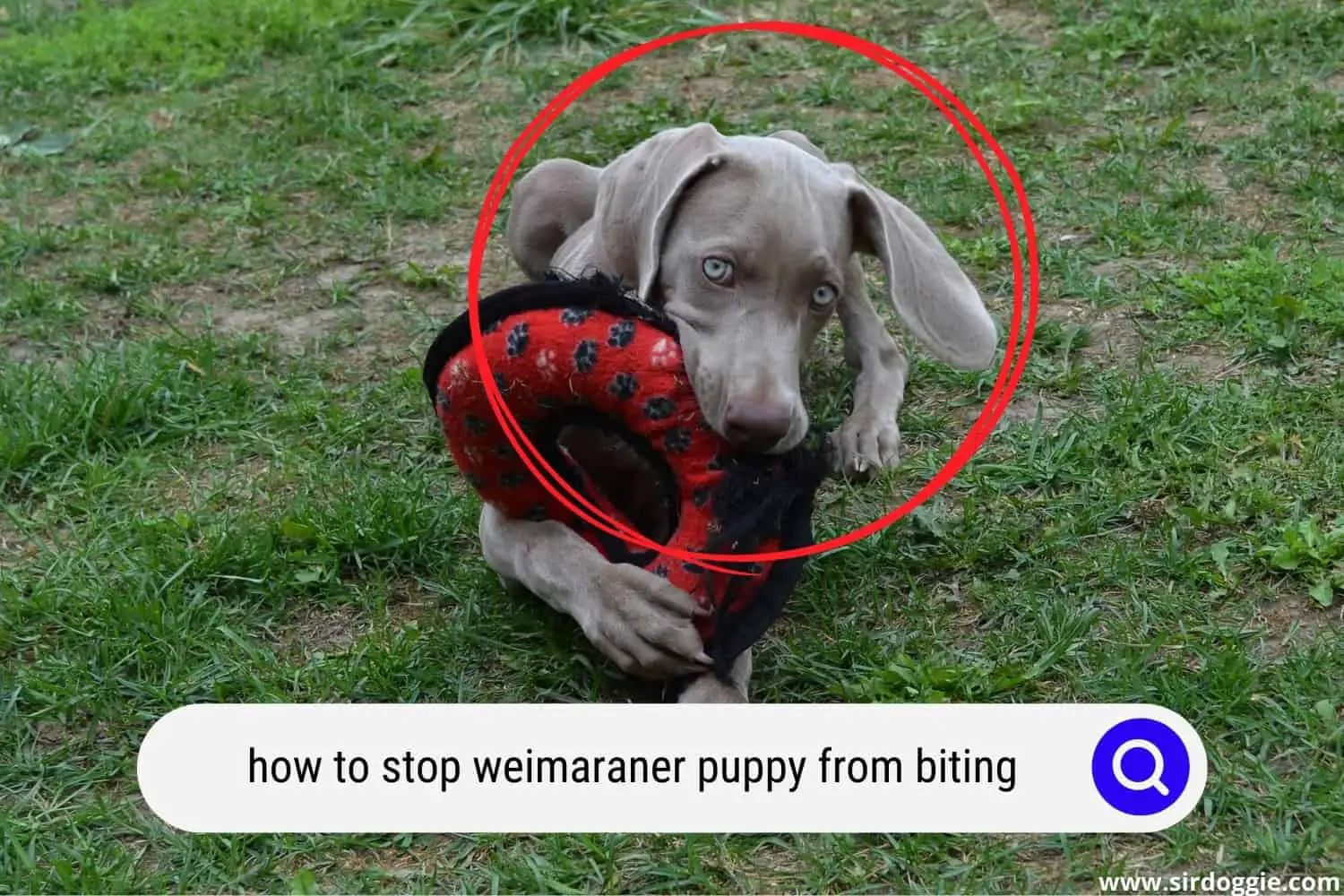How Can I Stop My Weimaraner Puppy from Biting?
Weimaraner breed canines are loyal and loving dogs that just want to be part of your family. They are also known for their trainability, which means that you can be sure that you can teach your puppy not to bite with constant training and positive reinforcement.

It is essential to mention that biting is part of your pet’s natural instincts and any other dog around the world, so you should not expect a change in behavior overnight. If possible, it is best to start training your canine not to bite while it is still a puppy. However, adult dogs can also learn not to bite.
A Weimaraner puppy that bites may appear innocent enough. Still, if it gets out of control, the puppy’s bite can lead to a serious problem of dog aggression in adult Weimaraners.
“Biting” is a natural instinct that most animals possess, so if your puppy bites and licks, it is not something to worry about. However, you will need to train your dog not to excessively lick and bite people, starting when it is still small.
Related Reading: Is Weimaraner Good with Babies?
How Can I Stop My Weimaraner Puppy from Biting?
Although a puppy bite is a natural behavior, you can teach your pet to stop biting things or people.
To do this, you need to make sure you perform the steps properly without having to undermine your puppy’s lovable and authoritative demeanor. One of the most important things, in this case, is to be totally serious about it.
1. Don’t Joke with Your Weimaraner Puppy
If you plan to take the situation seriously, do not allow games and fun to distract you from your main objective with your pet. For your dog, this is a contest. Each contest is for leadership, and remember that the dog that bites the most emerges as the leader.
That is why you should always remain firm and severe when training your puppy.
2. Don’t Play Tug of War with Your Weimaraner Puppy
Again, this is a contest for your dog, and it’s very similar to the moments a wolf faces in the wild when it pulls out a piece of meat. Your dog won’t want to give in.
The more you try to train your Weimaraner not to bite, the more insistent the learning process will be.
3. Don’t Let Your Weimaraner Chew on Your Clothes
Unfortunately, this is one of the reasons why puppies start chewing and biting. Make sure to keep clothing off the floor and out of your pet’s sight.
4. Don’t Reward Your Puppy When It Licks or Bites
That includes the other doggy behavior, which is licking. Puppies have a very oral fixation, and a small lick can lead to several. Multiple licks can lead to small bites, and very soon, your puppy will be biting you or anything around it.
Do not reward the licking or biting activity of your Weimaraner puppy under any circumstances. Do not talk to your dog, pet it, or look it in the eye while it behaves in this way.
If you teach your dog not to nip or bite when it is young, it will appropriately behave when it is older, and it will know that a puppy that bites does not have acceptable behavior in your pack.
Why Does My Weimaraner Puppy Bite?
There are many reasons why your Weimaraner puppy might start to bite. However, it can affect any breed of dog.
- The puppy may feel pressured or even uncomfortable around it at a young age, causing poor socialization development.
- The puppy is developing aggressive behavior. This reason is very common in Weimaraners since all puppies go through this stage when they are still babies.
- One of the most common reasons is that the puppy has started to lose its baby teeth.
Weimaraner Tooth Growth
The main cause of a puppy biting is tooth growth. Whatever its breed type, every canine begins to experience the sensation of wanting to bite when their teeth start to develop.
During the first months of the animal’s life, every dog experiences a change in teething and, as a consequence, feels discomfort in its teeth. The dog’s response is to bite down everything it can find to relieve such pain in its mouth.
Method to Train My Weimaraner Dog Not to Bite
One of the most necessary things when training your pet is knowing why it likes to bite.
Step 1
Find out why your Weimaraner puppy bites so often.
Step 2
Take one of your dog’s favorite toys and start playing with it. At this point, you should already have a general idea of what causes your puppy to bite, so during play, you have to use that action to get your canine to use its teeth.
Step 3
Exclaim Ouch! as soon as your puppy bites you, with a loud, high-pitched voice. This sound should surprise your Weimaraner to let go of you.
Step 4
Give your Weimaraner puppy about 20-30 seconds to calm down and then start playing with it again. Repeat the same steps as before to get your puppy to bite, then respond immediately.
Step 5
Consistency is important. You have to keep practicing day after day with your puppy since these types of attitudes in a Weimaraner dog do not disappear from one moment to the next.
Related Reading: When Do Weimaraners Stop Teething?

Our Recommendations
Always train your pet for at least 1 to 2 hours a day. In this way, you will observe that over time the biting attitude of your Weimaraner will disappear.
Use a variety of dog toys when training, as it is a good idea sometimes to use several objects that it is used to chewing on. Through this, every time your dog sees the said item, it will associate it with your “whine” and will not want to approach it.
Related Reading: How To Stop A Pug Puppy From Biting

Family Dog Expert Author
Hi there! I’m Stuart, a devoted dog lover and family dog expert with over a decade of experience working with our furry companions. My passion for dogs drives me to share my knowledge and expertise, helping families build strong, loving bonds with their four-legged friends. When I’m not writing for SirDoggie, you’ll find me hiking, playing with my beautiful dog, or studying music.